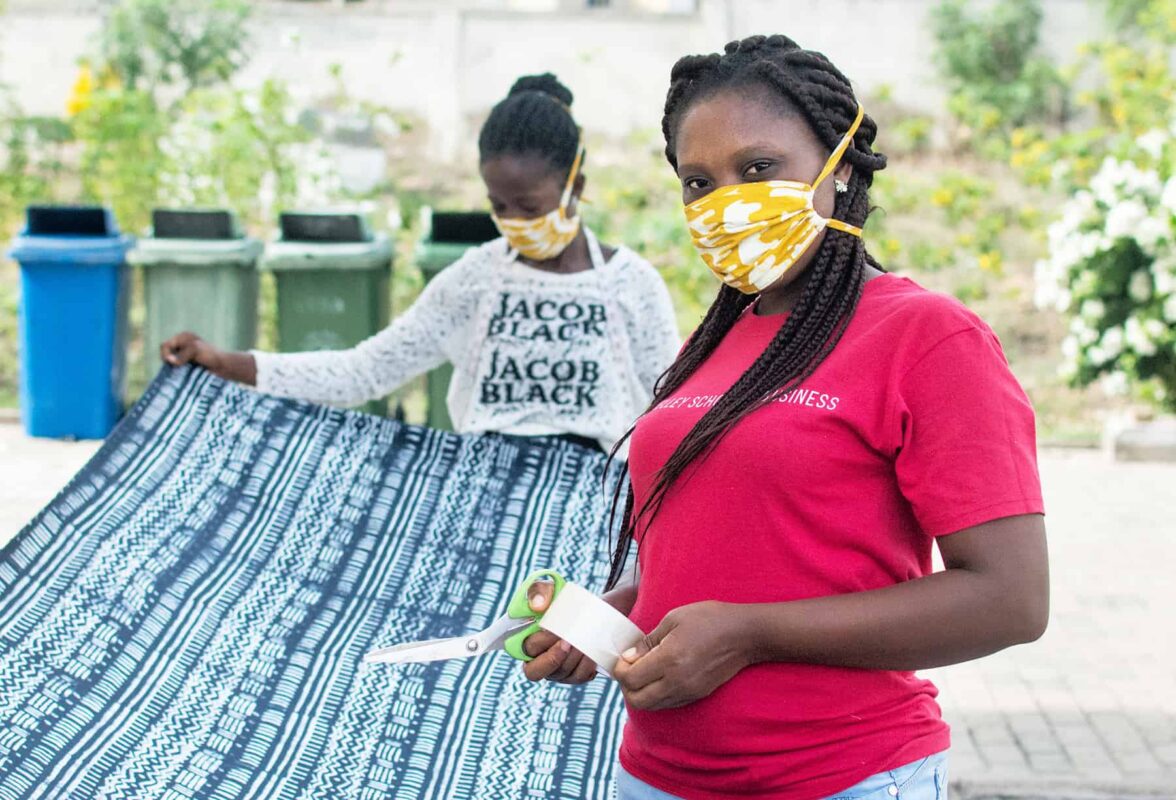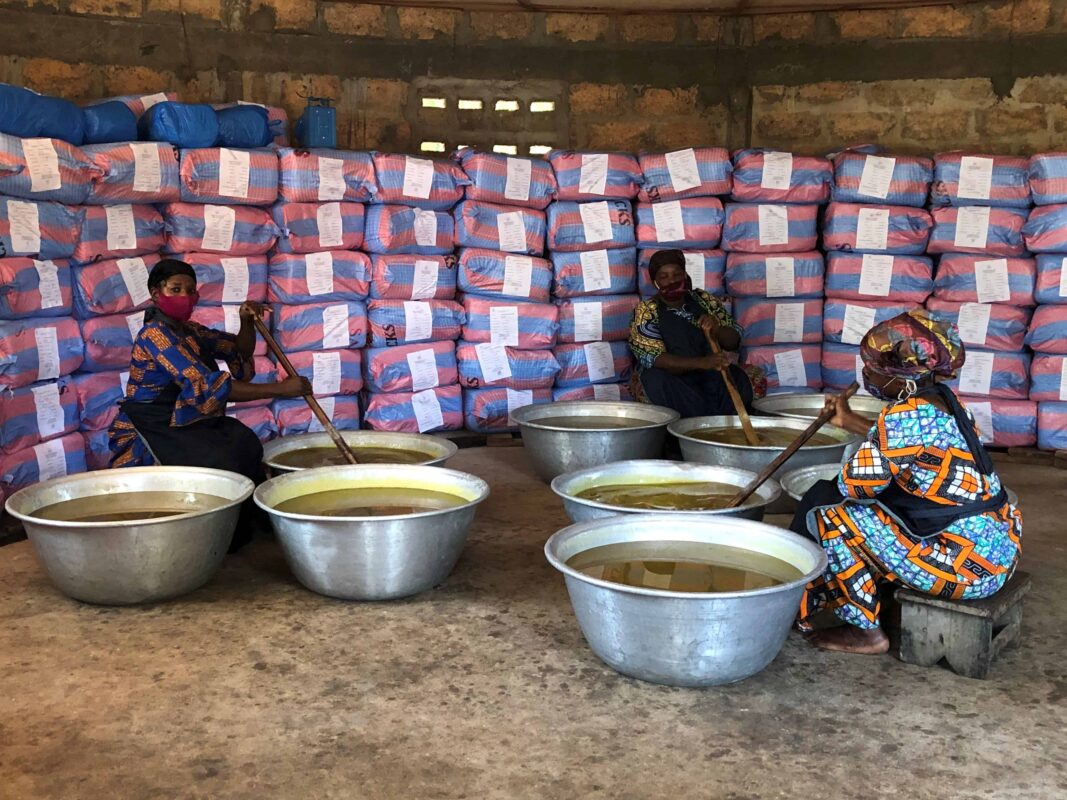As Africa adapts to the health, economic and social impacts of COVID-19, o Centro de Comércio e Investimento da África Ocidental is supporting businesses struggling to sustain commerce amidst the pandemic.
Global Mamas, a Ghana-based fair trade enterprise that works with women across Ghana to create and sell handcrafted products, is one of the first recipients of a COVID-19 rapid response grant from the Trade Hub.
Em 2020, Global Mamas suffered a 90 percent loss in its domestic retail sales and a 40 percent loss in global sales. Even after reducing income, Global Mamas had to face the prospect of organization-wide layoffs of women, many of whom are the primary income earners in their households.
“The reduced income for the workforce has already started a ripple effect that is negatively impacting hundreds of people in their families and communities. Though nobody can predict the future, we are bracing ourselves for weakened sales across all markets through 2021 and possibly beyond,” says Kristin Johnson, Founder and Sales Director at Global Mamas.
Responding to this need, the Trade Hub’s co-investment grant of $497,000 with Global Mamas will leverage private funding of $2 milhão, stabilizing the firm and staving off lay offs.
Preserving economic gains for women in West Africa
Financiado pelo NÓS. Agência para o Desenvolvimento Internacional, the Trade Hub bridges development and business goals by providing co-investment grants to stimulate the West African economy and create jobs. Em dezembro 2020, USAID designated an additional $50 milhões em fundos para o Centro para o Comércio, com $36 million allocated specifically for COVID-19 rapid response, increasing the working capital available to small- and medium-sized businesses hit hard by the coronavirus.
“These grants will be our most powerful response to the pandemic, as they are important to the survival of businesses,”diz Michael Clements, o Chefe do Partido do Centro para o Comércio.

Com este financiamento adicional, the Trade Hub is able to leverage partnerships to retain employment, overcome disruptions in export-oriented supply chains, support domestic food security initiatives and develop local solutions to mitigate COVID-19’s impact. Helping businesses retain the level of their workforce pre-pandemic is one of the most impactful ways to protect livelihoods and promote growth.
With the capital deployed to Global Mamas, the company expects to preserve 258 empregos, criar 85 new jobs and launch nine new products by the end of 2022.
These efforts are coordinated under Global Mamas’ “Women Rising” project, which addresses the economic inequality of women in West Africa. To keep this momentum, the organization is working to diversify products and pivot to meet shifting demands amidst COVID-19.
“Global Mamas aims to build a more resilient organization by developing alternative income streams through product diversification and targeted-marketing efforts,” says Renae Adam, Founder and Executive Director. “By the end of 2022, we expect to bring sales back to pre-pandemic levels and position the organization for growth, which will preserve existing jobs and create new jobs through and beyond the COVID-19 crisis.”
Global Mamas forecasts its domestic sales in Ghana to recover and then increase by the end of the project cycle, with its export sales reaching nearly $1.6 milhão, primarily to the United States.
Stabilizing supply chains
The Trade Hubs is set to support 12 firms in similar situations as Global Mamas through rapid response relief funding in the next three months, creating more than 17,000 jobs through these co-investments.
The Togolese fair trade shea company Agbanga Karite Alaffia SARL also faced a sharp drop in sales and production as borders closed in early 2020. Providing jobs and skills development in rural communities, Alaffia has worked in the central savannah region of Togo for 17 anos. But recent setbacks have hit the company hard.
Alaffia Togo normally processes 40 para 70 metric tons of shea kernels per month to supply its U.S. counterpart with the shea needed for manufacturing products. No entanto, COVID-19 safety measures delayed the purchasing of the kernels for months, stalling production.
The Trade Hub funding of $299,000 will assist Alaffia to rapidly secure the additional shea kernels needed to fulfill its 2021 forecasted demand to the United States and elsewhere, as well as offset the increased costs it continues to incur as a result of health and safety measures put in place.
“This partnership with the Trade Hub is a major reinforcement of Alaffia’s economic empowerment in Togo, and it facilitates our initiatives for sustainable development, job creation for women and youth, and improved private sector competitiveness,” says Alaffia’s Founder Olowo-n’djo Tchala.
The funding to purchase the shea kernels will preserve over 300 jobs and create 20 new shea processing positions for women and youth. It will also sustain income for 6,352 women shea kernel collectors at a time when local market demand is increasingly insecure.

Stimulating economic growth during COVID-19
The Trade Hub’s overarching goal is to forge partnerships that unlock private capital in the region, creating sustainable and inclusive economic growth for organizations and communities that may not have access to resources needed. To do that effectively, the Trade Hub is adapting its strategies to the unique challenges posed by the pandemic.
Desta maneira, these co-investments represent a piece of the larger picture.
Our job is to contribute to increasing economic development that is more resilient, democratic and integrated,”Diz Daniel Moore, USAID’s West Africa Mission Director.